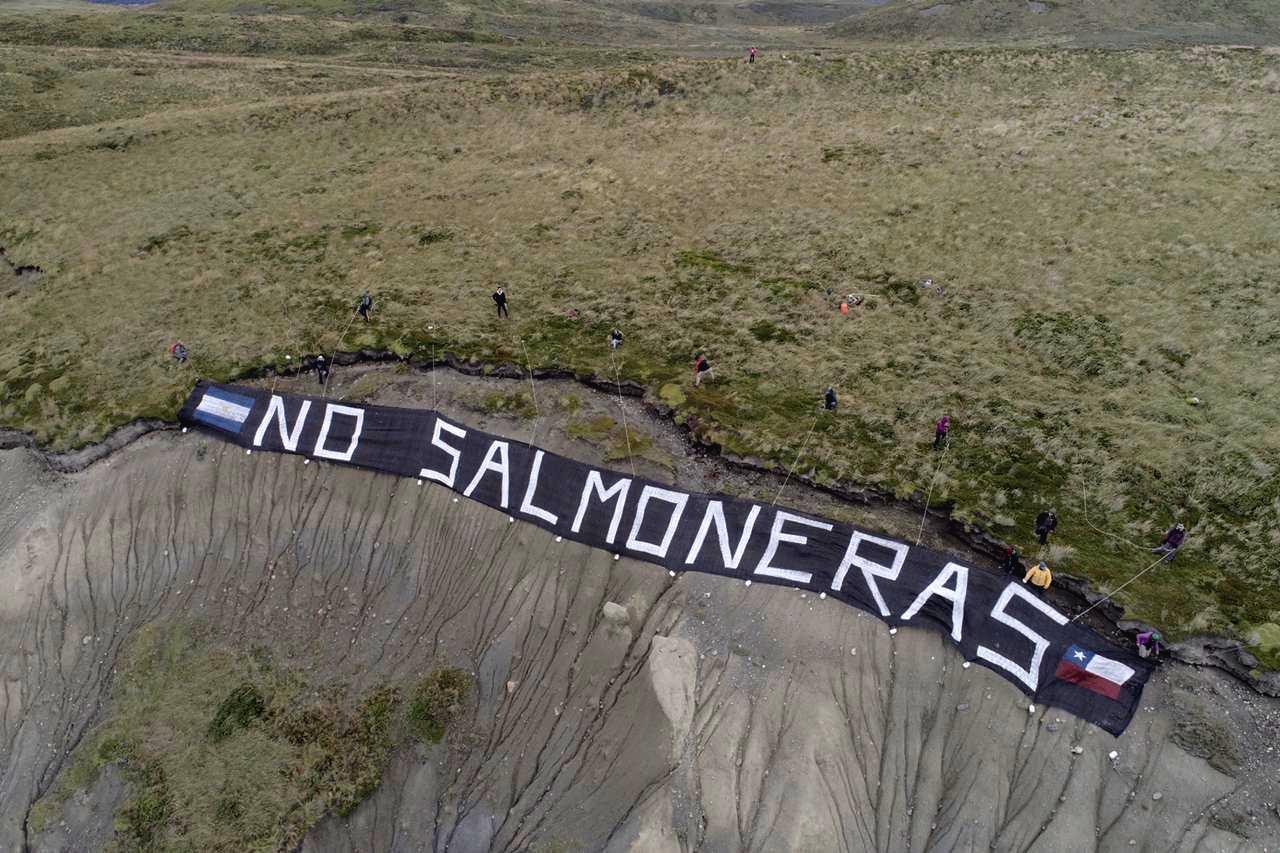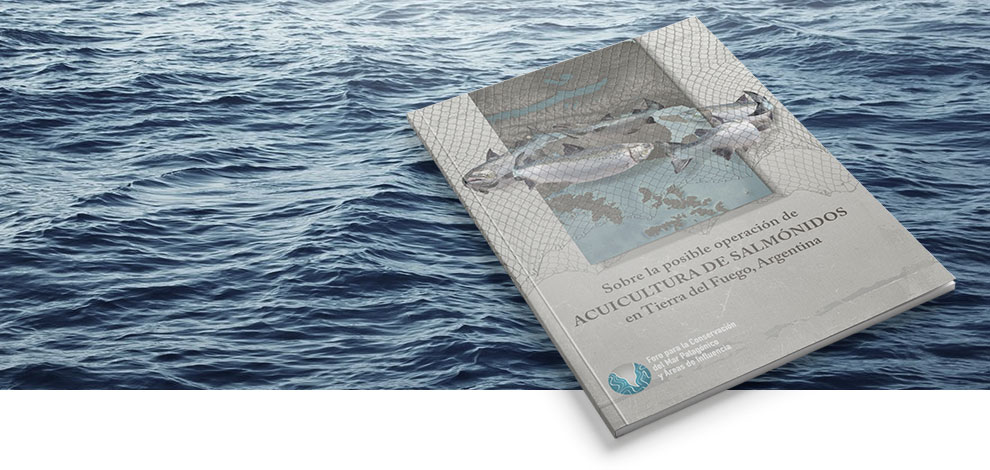The Forum for the Conservation of the Patagonian Sea and Areas of Influence supports and shares the joint binational position of the Deliberating Council of Ushuaia and the Community Council of Puerto Williams, political authorities, communities of indigenous peoples and social organizations of both cities against salmon farming in the Beagle Channel.

On Sunday, March 31, the communities of Puerto Williams and Ushuaia saw the kings of Norway off with demonstrations against the installation of salmon farms on the Beagle Channel. The group @NoSalmoneras on the Beagle Channel and volunteers placed a 50 meter sign on Gable Island with the message #NoSalmoneras. / Image: Datum Sant
Municipal authorities, people from the civil society and members of the Yagán community and other indigenous peoples from Ushuaia, Argentina, and Puerto Williams, Chile, vigorously reject the installation of salmon farms in waters of the Beagle Channel because they endanger the quality of the environment and, therefore, the genuine development of the region, since they have a negative impact on one of the few tourist paradises in the world where the harmful effects of human activity are still imperceptible.
We demand that national, regional and provincial authorities review the decisions they adopted since they are wrong, and were not discussed with local populations. We, the residents of the cities along the coast of the Beagle Channel, demand the right to decide on the growth of our region. Whether it will be based on the preservation of the landscape, management of tourism and sustainable development of natural resources, or whether it will be through intensive and highly contaminating activities such as salmon farming, something that would repeat past mistakes.
We understand that the expansion of tourism activities is not compatible with the installation of salmon farms. In the face of this dilemma, they denied us the opportunity to choose. It is unbelievable that in 2019, with democracy consolidated in both countries, official offices three thousand kilometers away from the places of interest, make irreversible decisions ignoring the collective projects that entrepreneurs from Argentina and Chile have been developing for more than a century on both sides of the Beagle Channel.
Nine out of ten tourists who visit Ushuaia and / or Puerto Williams navigate the Beagle Channel, attracted by the scenic value of the landscape, its environmental quality, its mystic feeling of final destination, virgin territory in the history of navigators and brave indigenous peoples that adapted to unique environmental conditions. The Beagle channel connects us and commits us to take care of it. The Treaty of Peace and Friendship, of 1984, the Maipú Treaty for the Integration and Cooperation between the Republic of Chile and the Republic of Argentina, of 2009, and the requirements of UNESCO declaring Cape Horn a Biosphere Reserve (2005) set unavoidable guidelines.
In the same way, there are plenty of scientific reports written by recognized institutions and professionals that describe clearly the negative impact of salmon farming, adding the consequences of introducing species as the second cause of biodiversity loss after habitat destruction.

Document stating the position of the Forum for the Conservation of the Patagonian Sea regarding the possible introduction of salmon farming.
The report entitled On the possible operation of salmon farming in Tierra del Fuego, Argentina, of the Forum for the Conservation of the Patagonian Sea and Areas of Influence, concludes that salmon farms involve the following risks for environmental quality and the economic activities that depend on it:
1. The escape of salmonids, which would result in the introduction of exotic species, from culture cages into the natural environment;
2. The abuse of antibiotics, antiparasitics and other chemical substances;
3. The introduction and spread of diseases and their causative agents;
4. The accumulation of solid and liquid wastes on the seafloor, derived from uneaten food, feces and dead salmonids;
5. The industrial waste that companies leave in the fjords, such as abandoned cages, plastics, buoys, ropes, etc;
6. Pressure on wild species fisheries, which provide fish used to produce fishmeal and fish oil to feed salmonids;
7. And the direct and indirect negative interactions with marine mammals and birds, among which some species have a delicate state of conservation.
The report Background for the conservation and exclusion of salmon farming in the Cabo de Hornos Biosphere Reserve, from the Subantarctic Biocultural Conservation Program of the University of Magallanes, on the negative effects of salmon farming in our region is also conclusive. This work also proposes that “productive activities must obtain social legitimacy, through the involvement of communities in processes with high standards of transparency and symmetry, respecting the economic, social and cultural rights of artisanal fishermen and indigenous peoples present in the territory…”
The undersigned make a call to the community of Ushuaia and the Commune of Cape Horn, all intermediate entities from both cities, and to the local, regional, provincial and national authorities that represent us, to speak out against this outrage to local development.
It is nonsense to think about generating employment at the expense of the environment. Salmon farms imply salmon for us today, hunger for future generations. We can prevent it; it is our duty to do so.
SIGNATURES
Indigenous peoples and NGOs: David Alday, Presidente Comunidad Yagan de Puerto Williams; Víctor Vargas Filgueira, Comunidad Indígena Yagan Paiakoala de Tierra del Fuego; Rubén Darío Maldonado, Presidente Comunidad Selk´nam Rafaela Ishton; Comité Cultural Puerto Williams; Comunidad Huilliche Mapuche de Puerto Williams; José Enrique Cisterna, Mónica Cisterna, Nely Praxedes López, Amanda Alicia Beban, Amelia Norma Muriel, Angélica Caimapo, Comisión de Antiguos y Pioneros Pobladores de Ushuaia; Julio Lovece, presidente, Fundación Ushuaia XXI; Nancy Fernández, presidenta, Asociación Manekenk; Adolfo Imbert, presidente, Asociación Civil Conservación Península Mitre; Stella Domínguez, presidenta, Asociación Bahía Encerrada (ABE); Dra. Tamara Contador, coordinadora, Fundación Omora; Mariano Rodríguez, presidente, Proyectos Secretos del Beagle; Pablo Camba, presidente, Asociación de Profesionales de Turismo de Tierra del Fuego; Jaime Cárcamo Álvarez, presidente, Cámara de Turismo de Cabo de Hornos; Miguel Gallardo Sarado, presidente, Asociación Gremial de Empresarios Turísticos de Cabo de Hornos; Lic. Carlos Pedro Vairo, Director, Museo Marítimo de Ushuaia; Comité Cultural de Puerto Williams; Diana Méndez, presidenta, club náutico Eco Deportes; Estefanía González, coordinadora de Océanos, Grenpeace Andino (Argentina, Chile, Colombia); Nancy Fernández, presidente Asociación de Docentes de Ciencias Biológicas de la Argentina; Sabrina Zalazar, presidenta, Agrupación por la Soberanía Alimentaria y Salud Comunitaria Wallampu Kimün; Osvaldo García Napo, Embajador de Paz (Mil Milenios, con auspicio UNESCO); siguen firmas…
Scientific community: Alexandra Sapoznikow, coordinadora, Foro para la Conservación del Mar Patagónico; Programa de Conservación Biocultural Subantártica, Universidad de Magallanes; Martín Vázquez, antropólogo, UNTDF, CADIC/CONICET; Jimena Oria, antropóloga, CADIC/CONICET; Dr. Alejandro Valenzuela, biólogo, UNTDF, CADIC/CONICET; Dr. Christopher Anderson UNTDF, CADIC/CONICET; Dra. María Paula Sotelano UNTDF, CADIC/CONICET; Mariano Diez, biólogo, CADIC/CONICET; Dra. Andrea Raya Rey, bióloga, CADIC/CONICET; María Bagur, bióloga, CADIC/CONICET; Martina Sasso, directora Programa Marino CLT; Luciana Ricciardelli, investigadora CADIC/CONICET; Natalia Dellabianca, bióloga; Federico Tapella, biólogo, CADIC/CONICET; Carolina Romero, bióloga, CADIC/CONICET; Claudio Roig, geólogo; María Natalia Viola, bióloga, CADIC/CONICET, Museo del Fin del Mundo; María Laura Presta, bióloga, IBBEA, UBA, CONICET; Analía San Martín, bióloga, CADIC/CONICET; Sabrina Harris, bióloga, CADIC/CONICET; Ricardo Sáenz Samaniego, CADIC/CONICET; Gabriela Scioscia, CADIC/CONICET; Samanta Dodino, CADIC/CONICET; Amira Salom, bióloga, CADIC/CONICET; Nicolás Fioramonti, biólogo, CADIC/CONICET; Natalia Asplanato, bióloga, CADIC/CONICET; Ulises Balza, biólogo, CADIC/CONICET; Yamila Becker, bióloga, CADIC/CONICET; Nicolás Lois, biólogo, EGE, FCEyN, UBA, CONICET; siguen firmas…
Municipal authorities: Carolina Goic, Senadora nacional, República de Chile; Guido Girardi, senador nacional (Presidente de la Comisión de Ambiente), República de Chile; Patricio Fernández Alarcón, alcalde Comuna Cabo de Hornos; Gustavo Melella, intendente Río Grande, FORJA; Silvio Bocchicchio, concejal Ushuaia, ECoS; Juan Manuel Romano, concejal Ushuaia; Tomás Bertotto, concejal Ushuaia, CC-Ari; Ricardo Garramuño, concejal Ushuaia, MPF; Gastón Ayala, concejal Ushuaia, MPF; Juan Carlos Pino, concejal Ushuaia, FPV; Hugo Romero, concejal Ushuaia, FPV; Miriam Mora, concejala Río Grande, FPV; Verónica González, concejala Río Grande, FORJA; Paola Speake Ojeda, concejala Comuna Cabo de Hornos; Juan Velásquez Muñoz, concejal Comuna Cabo de Hornos; Carolina Güenel, concejala Comuna Cabo de Hornos; Daniel Valdebenito Contreras, concejal Comuna Cabo de Hornos.
Political parties: Silvio Bocchicchio, presidente, Partido Espacio de Concertación Social (ECoS), en Concertación Fueguina; Liliana Fadul, presidenta, Partido Federal Fueguino (PFF) en Concertación Fueguina; Hugo Peralta, presidente, Partido Somos TDF, en Concertación Fueguina; Daniel Moreno, presidente, Partido Unidad Popular (UP); Luis Alberto Cárdenas, presidente, Partido Arraigo y Renovación (PAR); Fernando Temari, presidente, Partido Gen; Juan Francisco Flores, apoderado, Partido Popular (PP); Moisés Solorza, vicepresidente, Partido Solidario TDF; siguen firmas…
Union entities: Centro de Jubilados de ATE de Río Grande y de Ushuaia; Pol Baiz, secretario General, CTA Autónoma; siguen firmas…